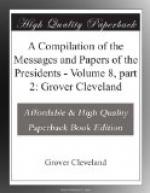The acts of Congress of the last session relative to the surveying, marking, or laying out roads in the Territories of Florida, Arkansas, and Michigan, from Missouri to Mexico, and for the continuation of the Cumberland road, are, some of them, fully executed, and others in the process of execution. Those for completing or commencing fortifications have been delayed only so far as the Corps of Engineers has been inadequate to furnish officers for the necessary superintendence of the works. Under the act confirming the statutes of Virginia and Maryland incorporating the Chesapeake and Ohio Canal Company, three commissioners on the part of the United States have been appointed for opening books and receiving subscriptions, in concert with a like number of commissioners appointed on the part of each of those States. A meeting of the commissioners has been postponed, to await the definitive report of the board of engineers. The light-houses and monuments for the safety of our commerce and mariners, the works for the security of Plymouth Beach and for the preservation of the islands in Boston Harbor, have received the attention required by the laws relating to those objects respectively. The continuation of the Cumberland road, the most important of them all, after surmounting no inconsiderable difficulty in fixing upon the direction of the road, has commenced under the most promising auspices, with the improvements of recent invention in the mode of construction, and with the advantage of a great reduction in the comparative cost of the work.
The operation of the laws relating to the Revolutionary pensioners may deserve the renewed consideration of Congress. The act of the 18th of March, 1818, while it made provision for many meritorious and indigent citizens who had served in the War of Independence, opened a door to numerous abuses and impositions. To remedy this the act of 1st May, 1820, exacted proofs of absolute indigence, which many really in want were unable and all susceptible of that delicacy which is allied to many virtues must be deeply reluctant to give. The result has been that some among the least deserving have been retained, and some in whom the requisites both of worth and want were combined have been stricken from the list. As the numbers of these venerable relics of an age gone by diminish; as the decays of body, mind, and estate of those that survive must in the common course of nature increase, should not a more liberal portion of indulgence be dealt out to them? May not the want in most instances be inferred from the demand when the service can be proved, and may not the last days of human infirmity be spared the mortification of purchasing a pittance of relief only by the exposure of its own necessities? I submit to Congress the expediency of providing for individual cases of this description by special enactment, or of revising the act of the 1st of May, 1820, with a view to mitigate the rigor of its exclusions in favor of persons to whom charity now bestowed can scarcely discharge the debt of justice.




